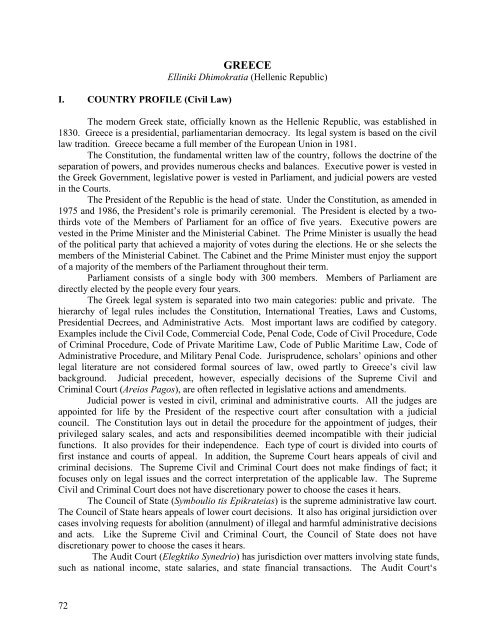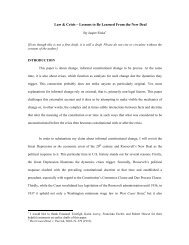Guide to Foreign and International Legal Citations - New York ...
Guide to Foreign and International Legal Citations - New York ...
Guide to Foreign and International Legal Citations - New York ...
You also want an ePaper? Increase the reach of your titles
YUMPU automatically turns print PDFs into web optimized ePapers that Google loves.
I. COUNTRY PROFILE (Civil Law)<br />
72<br />
GREECE<br />
Elliniki Dhimokratia (Hellenic Republic)<br />
The modern Greek state, officially known as the Hellenic Republic, was established in<br />
1830. Greece is a presidential, parliamentarian democracy. Its legal system is based on the civil<br />
law tradition. Greece became a full member of the European Union in 1981.<br />
The Constitution, the fundamental written law of the country, follows the doctrine of the<br />
separation of powers, <strong>and</strong> provides numerous checks <strong>and</strong> balances. Executive power is vested in<br />
the Greek Government, legislative power is vested in Parliament, <strong>and</strong> judicial powers are vested<br />
in the Courts.<br />
The President of the Republic is the head of state. Under the Constitution, as amended in<br />
1975 <strong>and</strong> 1986, the President’s role is primarily ceremonial. The President is elected by a twothirds<br />
vote of the Members of Parliament for an office of five years. Executive powers are<br />
vested in the Prime Minister <strong>and</strong> the Ministerial Cabinet. The Prime Minister is usually the head<br />
of the political party that achieved a majority of votes during the elections. He or she selects the<br />
members of the Ministerial Cabinet. The Cabinet <strong>and</strong> the Prime Minister must enjoy the support<br />
of a majority of the members of the Parliament throughout their term.<br />
Parliament consists of a single body with 300 members. Members of Parliament are<br />
directly elected by the people every four years.<br />
The Greek legal system is separated in<strong>to</strong> two main categories: public <strong>and</strong> private. The<br />
hierarchy of legal rules includes the Constitution, <strong>International</strong> Treaties, Laws <strong>and</strong> Cus<strong>to</strong>ms,<br />
Presidential Decrees, <strong>and</strong> Administrative Acts. Most important laws are codified by category.<br />
Examples include the Civil Code, Commercial Code, Penal Code, Code of Civil Procedure, Code<br />
of Criminal Procedure, Code of Private Maritime Law, Code of Public Maritime Law, Code of<br />
Administrative Procedure, <strong>and</strong> Military Penal Code. Jurisprudence, scholars’ opinions <strong>and</strong> other<br />
legal literature are not considered formal sources of law, owed partly <strong>to</strong> Greece’s civil law<br />
background. Judicial precedent, however, especially decisions of the Supreme Civil <strong>and</strong><br />
Criminal Court (Areios Pagos), are often reflected in legislative actions <strong>and</strong> amendments.<br />
Judicial power is vested in civil, criminal <strong>and</strong> administrative courts. All the judges are<br />
appointed for life by the President of the respective court after consultation with a judicial<br />
council. The Constitution lays out in detail the procedure for the appointment of judges, their<br />
privileged salary scales, <strong>and</strong> acts <strong>and</strong> responsibilities deemed incompatible with their judicial<br />
functions. It also provides for their independence. Each type of court is divided in<strong>to</strong> courts of<br />
first instance <strong>and</strong> courts of appeal. In addition, the Supreme Court hears appeals of civil <strong>and</strong><br />
criminal decisions. The Supreme Civil <strong>and</strong> Criminal Court does not make findings of fact; it<br />
focuses only on legal issues <strong>and</strong> the correct interpretation of the applicable law. The Supreme<br />
Civil <strong>and</strong> Criminal Court does not have discretionary power <strong>to</strong> choose the cases it hears.<br />
The Council of State (Symboulio tis Epikrateias) is the supreme administrative law court.<br />
The Council of State hears appeals of lower court decisions. It also has original jursidiction over<br />
cases involving requests for abolition (annulment) of illegal <strong>and</strong> harmful administrative decisions<br />
<strong>and</strong> acts. Like the Supreme Civil <strong>and</strong> Criminal Court, the Council of State does not have<br />
discretionary power <strong>to</strong> choose the cases it hears.<br />
The Audit Court (Elegktiko Synedrio) has jurisdiction over matters involving state funds,<br />
such as national income, state salaries, <strong>and</strong> state financial transactions. The Audit Court‘s
















